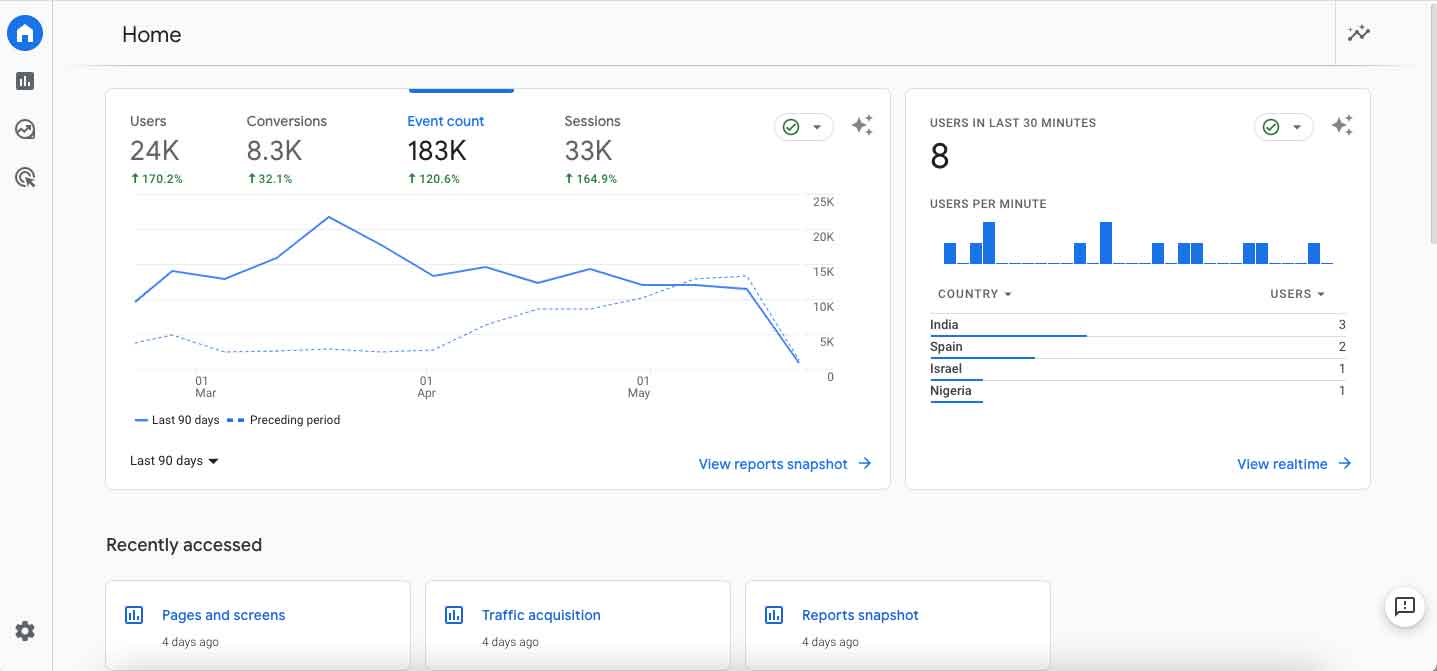With all its latest features, Google Analytics 4 (GA4) can help you stay ahead of your competitors and measure website performance more effectively.
Learn more about enhanced data collection that allows a deeper understanding of user behavior and segmenting capabilities that allow analysis into different groups or sources for better targeting and decision-making.
AI-Powered Predictive Analytics
By harnessing artificial intelligence for analytics purposes, Google Analytics 4 enables businesses to enhance their SEO strategy and gain an edge in today’s competitive market landscape.
Essentially, predictive analytics uses machine learning algorithms to analyze vast volumes of data and identify patterns that help predict future outcomes based on historical trends. With GA4’s integration of these advanced technologies comes a wealth of valuable insights that can guide decision-making processes related to sales campaigns, user engagement activities, or optimization plans tailored specifically toward boosting your site’s search engine rankings.
Embracing AI-powered predictive analysis within your GA4 platform streamlines performance tracking and offers proactive solutions. These solutions aim to improve customer retention rates, conversion goals set by marketing teams, and growth objectives through digital channels. Ultimately, these changes are designed for optimal end-user experiences and for creating impactful website changes.
However, it’s crucial to understand that unlocking the full potential behind such game-changing features requires adequate visitor volume and proper setup procedures. Therefore, implementing them might be beyond reach if limitations regarding user base size or technical expertise surrounding implementation specifics persist.
Customer Lifecycle Based Reporting
GA4 provides greater insights into user behavior, allowing you to make data-driven decisions and optimize marketing strategies. By analyzing each stage—acquisition, engagement, monetization, and retention—you can identify opportunities or weaknesses within your online presence.
Acquisition focuses on attracting potential customers through various channels, such as organic search results or paid advertisements. Constantly monitoring this step helps ensure high-quality traffic reaches your site while minimizing unnecessary costs. Engagement captures how users interact with content; by evaluating their browsing patterns and time spent per visit, adjustments can be made to increase satisfaction levels among visitors.
Monetization pertains to converting those engaged users into paying clients or loyal subscribers. Analyzing conversion rates highlights which areas require improvement regarding sales funnels and call-to-action elements on the site’s pages. Finally, retention emphasizes nurturing long-term relationships with existing clientele; providing personalized experiences catered towards individual preferences will encourage repeat business and positive word-of-mouth referrals.
Accurately Track Web and App Interactions
Incorporating cross-platform tracking ensures a comprehensive understanding of user behavior across multiple digital touchpoints. This holistic approach enables businesses to create seamless experiences tailored specifically for their target audience.
To begin incorporating accurate interaction tracking in GA4, establish User ID implementation on websites and apps alike. With this process in place, the platform can recognize users engaging with various devices or platforms, increasing data accuracy while providing valuable insights into customer journeys through different mediums.
Next, review existing event measurement recommendations provided by GA4, including pre-existing events like page_view or session_start, alongside customizing further specific actions relevant to your business goals, such as product_clicks or form_submissions.
By doing so, you’re empowering granular analysis capable of identifying areas requiring optimization within marketing strategies. Additionally, utilize Enhanced Measurement, a feature unique within Google Analytics 4, which automatically measures certain engagement indications without needing extra code adjustments from developers, saving time and reducing complexity during setup processes.
Lastly, regularly monitor collected data using advanced reporting options available through features like Analysis Hub, an essential component designed to improve decision-making capabilities based upon identified trends emerging amongst customers’ interactions over time.
Create Customer Reports
Delve deeper into Google Analytics 4 by creating custom reports tailored to your specific SEO goals. Custom reporting allows you to focus on the most relevant metrics for your business, making data analysis more efficient and actionable.
Begin by identifying key performance indicators (KPIs) crucial for understanding user behavior, such as organic search traffic, bounce rate, or average session duration. Next, take advantage of GA4’s flexible report-building features to arrange these KPIs in a meaningful way that aligns with your objectives. With filtering options and customizable dimensions like geographic location or device type, segmenting data becomes accessible even if it requires granular insights.
By consistently monitoring these tailor-made reports over time, you can observe trends related to web page optimization efforts while pinpointing areas requiring improvement concerning UX design or content quality. This ongoing assessment ensures optimal return on investment from SEO initiatives without overwhelming resources spent sifting through irrelevant information.
Leverage ‘Exploration’ Section
This powerful feature provides personalized insights that can propel your website’s performance and search engine ranking. You gain a clearer understanding of user behavior on your site by leveraging visualizations such as freeform tables, maps, pathing diagrams, and other data representations within this section.
The ‘Exploration’ feature allows you to perform in-depth analyses by simultaneously comparing multiple metrics or dimensions. For instance, examining organic traffic against specific landing pages helps identify which content resonates best with users arriving from search engines. Additionally, exploring the effects of different marketing campaigns on customer engagement reveals what drives high-quality visits and conversions.
Customizing reports using filters ensures greater precision when extracting relevant information tailored to your unique requirements. The ability to segment valuable users based on their interactions uncovers hidden opportunities for growth through optimization efforts geared toward enhancing overall user experience.
Enhances Privacy Control
In today’s digital landscape, users demand increased data protection and transparency regarding their personal information.
GA4 places high importance on user privacy by offering advanced features that cater to these evolving expectations. For instance, you can utilize Consent Mode to gather insights while respecting your visitors’ consent preferences related to analytics and advertising cookies. This feature enables businesses like yours to adhere to regulatory requirements without sacrificing valuable analytical capabilities or compromising compliance with global regulations such as GDPR and CCPA.
Additionally, GA4 ensures anonymity by ceasing IP address storage altogether, a significant step forward compared with Universal Analytics, reducing concerns about tracking individual web users. Moreover, country-level privacy controls within GA-4 allow you finer management over user-level data collection at specific geographies based on local legal guidelines or company policies. In summary, enhanced privacy control is indispensable when optimizing your utilization of Google Analytics 4 for SEO purposes.
Investing time in understanding its various settings is the first step to maximizing customer satisfaction and marketing effectiveness. You should also align your strategies with ethical standards and industry best practices. Content optimization techniques are also important; proper tagging implementation is key. By taking these steps, you can maximize customer satisfaction and marketing effectiveness across platforms.
Address Cookies
With increasing privacy regulations and user concerns about data sharing, cookie tracking is becoming less reliable.
GA4 aptly responds to this challenge with its flexible implementation methods. To maintain accurate measurement while respecting users’ privacy preferences, ensure your site complies with all relevant legislation, such as GDPR or CCPA, when utilizing browser cookies. One approach is adopting a Consent Management Platform (CMP) that helps manage user consent collection efficiently, ensuring a seamless experience on desktop and mobile devices.
Additionally, consider using GA4’s built-in “User-ID” feature, which allows you to track visitors more accurately across multiple devices without relying solely on traditional cookie-based identifiers. This method can provide an enhanced view of customer journeys by connecting sessions from various touchpoints within their browsing history.
By addressing the critical aspects of cookies when configuring your GA4 property for organic search performance reporting, you can optimize your results more effectively. Additionally, this ensures that the collected data is accurate and trustworthy. Furthermore, it fully complies with evolving online marketing practices in today’s dynamic digital landscape.
Event and Conversion Tracking
Familiarize yourself with GA4’s advanced event and conversion tracking capabilities. Unlike Universal Analytics, GA4 allows for more granular event tracking, which helps identify specific user actions on your website or app.
Begin by defining events that matter most to your business, from button clicks, form submissions, video plays, or scrolling page depth. Configure them using custom parameters in GA4 so they get tracked accurately as desired conversions. Monitor real-time data to gain insights into how users engage with your site’s content and use this information strategically for optimizing the user experience.
Additionally, set up traffic-based goals linked to these crucial events; this enables you to measure the performance of your SEO campaigns and make informed decisions.
Google Analytics 4 is a powerful tool that can help with SEO. Utilizing its features will give you insights into user behavior on your website and how it affects search engine rankings. It also allows for tracking across different devices, platforms, languages, and time zones, making detailed analysis easier.
Additionally, the machine learning capabilities of GA4 let you create more targeted advertising campaigns and gain better visibility on organic traffic sources, thus improving the chances of success even further. With these tools, no one should longer ignore Google Analytics 4 for their SEO strategy!










